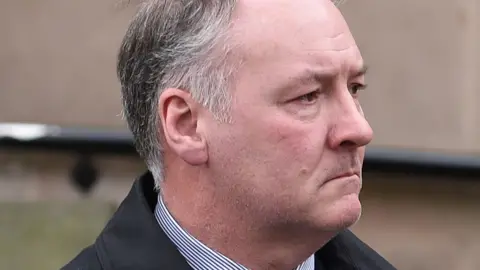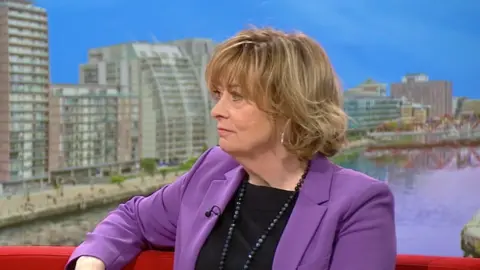Coroner rejects Paterson's opioid claim
 PA Media
PA MediaA coroner has rejected a suggestion by jailed surgeon Ian Paterson that one of his patients died of an opioid overdose.
The disgraced doctor told an inquest into the death of Elaine Morris on Tuesday that he was concerned her official cause of death - carcinomatosis and breast carcinoma - was incorrect.
He told the inquest "I'm concerned she died of opiate overdose", but two oncologists acting as experts to the inquests disagreed with Paterson's claim.
After hearing their evidence on Wednesday, judge Richard Foster said he could "safely reject opioid toxicity" as the cause of death of the 45-year-old from Shirley, West Midlands.
Paterson, who treated thousands of women at hospitals in the West Midlands, had told the inquest on Tuesday that Ms Morris's reported drowsiness in her medical notes suggested she was being overdosed on opiates.
The inquest heard that Ms Morris was being administered two opioids for pain relief: morphine sulphate tablets (MST) and Oramorph.
Her medical notes showed her being introduced to MST with 10mg sachets, being increased to 30mg and then reduced to 20mg due to "sleepiness".
The oncologists, Prof David Dodwell and Prof Pat Price, agreed that these were "entry level doses", with some patients being given up to 100mg or 150mg of MST.
This led them to believe she not had died of opioid toxicity, which the coroner then rejected as a potential cause of death.
Risks of radiotherapy
Elaine Morris's inquest is one of 63 into the deaths of Ian Paterson's former patients, to determine whether they died unnatural deaths.
This includes determining whether Paterson left any breast tissue behind during surgery which may have metastasized.
The disgraced surgeon was sentenced to 20 years in prison in 2017, after being convicted of wounding patients with botched and unnecessary operations, but will be eligible for release in 2027.
Elaine Morris died in 2002, aged 45, having been diagnosed with breast cancer aged 42.
Her inquest heard that she had suffered from severe epilepsy and cerebral palsy, as well as learning difficulties.
Oncologist Dr Talaat Latief had deemed radiotherapy unsafe for her, due to her inability to lie still and be in a room on her own, and claimed she would be unable to withstand the side-effects of chemotherapy.
Prof Price and Prof Dodwell both agreed that radiotherapy was a "non-starter" for Ms Morris, with Prof Price saying chemotherapy would have been "a high risk for a small benefit" for her.
However, Prof Dodwell expressed concern that Paterson performed surgery on Ms Morris when radiotherapy was never going to be an option for her.
"He's an experienced breast surgeon, he knows full well radiotherapy would be required," he told the inquest.
Paterson performed three surgeries on Ms Morris while she was a private patient with Spire Healthcare: a wide local excision on her right breast in September 1999, a diagnostic excision biopsy in January 2000, before performing a complete mastectomy in November 2000.

The inquest had also raised the question as to whether Paterson performing a mastectomy prior to November 2000 could have improved Ms Morris's prospects.
In a written report, Prof Price said: "In my opinion earlier mastectomy would not have altered the natural history of the disease and did not contribute to Ms Morris's demise, which was due to her having poor biology breast cancer and not being able to receive chemotherapy or radiotherapy due to her comorbidities."
However, at the inquest, both professors said they would defer to surgical experts on questions regarding surgery.
In the conclusion of her written report, Prof Price said: "In terms of causation, in this individual case the death appears to have been due to the extremely aggressive biology of Ms Morris' tumour and her inability to receive chemotherapy and radiotherapy due to her comorbidities and inability to achieve control of her local disease."
She added: "In my opinion, I can find no evidence that the treatment Ms Morris received from Mr Paterson or any other clinician more than minimally, negligibly or trivially contributed to her death."
Prof Price, who is instructed by Spire Healthcare in 11 cases involving Paterson at the company's private hospitals, had also been asked by the solicitors to the inquest to conduct a review of reports made by the medical experts on the inquests' multi-disciplinary team (MDT).
It came after Paterson raised concerns at the end of last year that one of the experts had shown bias and that their evidence should be excluded, in all of the cases not involving Spire Healthcare.
He cited an email from one of the MDT experts, professor and consultant breast surgeon Mike Dixon, in which he wrote to another member: "We need to find some way though of exposing Paterson as a liar and an incompetent surgeon."
While the email was "unfortunate, inappropriate and clumsy", Judge Foster said, it was not by itself indicative of actual or unconscious bias.
Despite this, he concluded it was best that Professor Dixon withdraw from the MDT for the purposes of the ongoing inquiries.
Follow BBC Birmingham on BBC Sounds, Facebook, X and Instagram.
